Tour Guide Resume Examples

Mar 21, 2025
|
12 min read
Crafting the perfect tour guide resume is your ticket to leading the way. Highlight your skills and experience to stand out in the field. Tour the path to success by creating a resume that truly guides your future employer.
Rated by 348 people
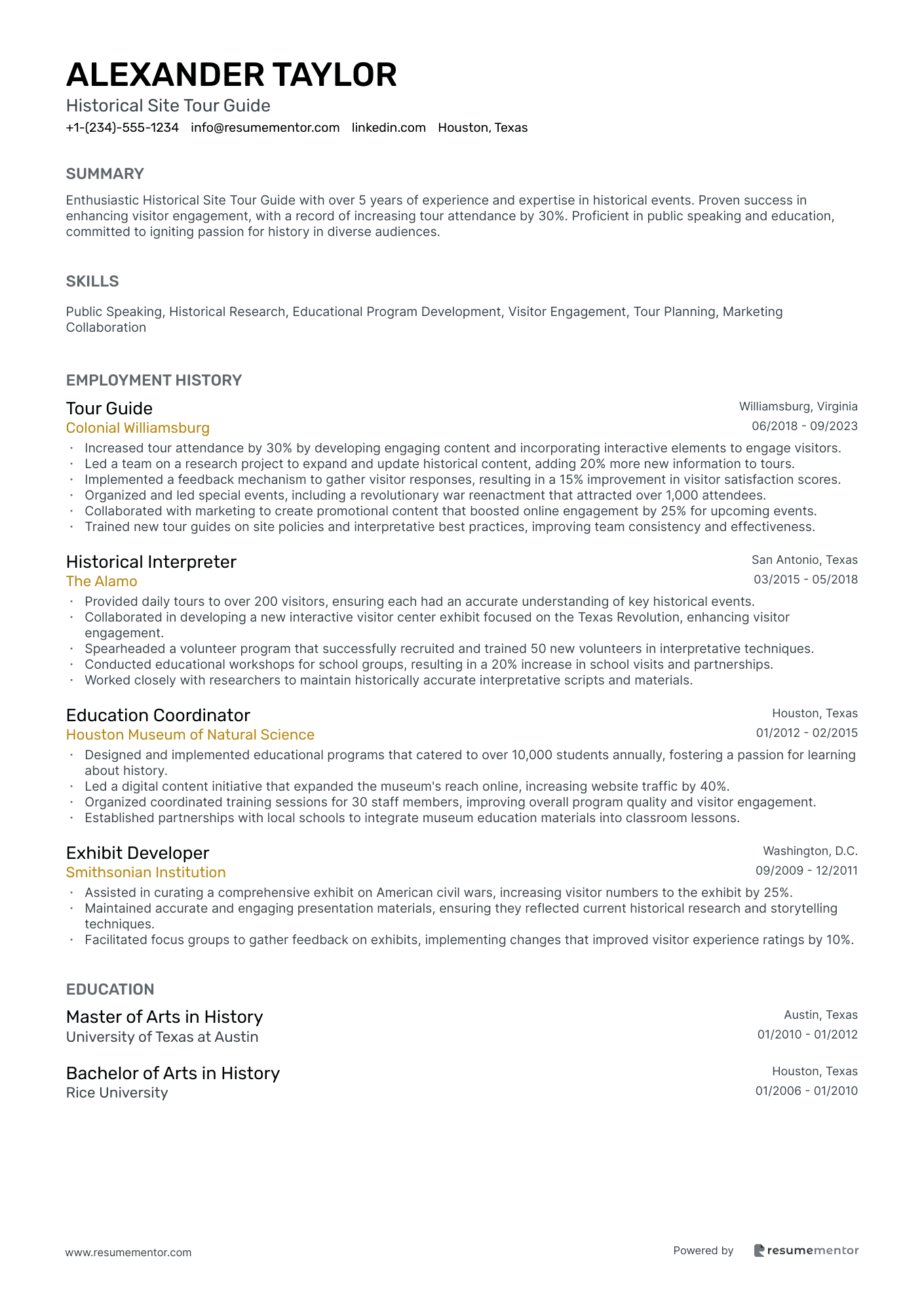
Historical Site Tour Guide
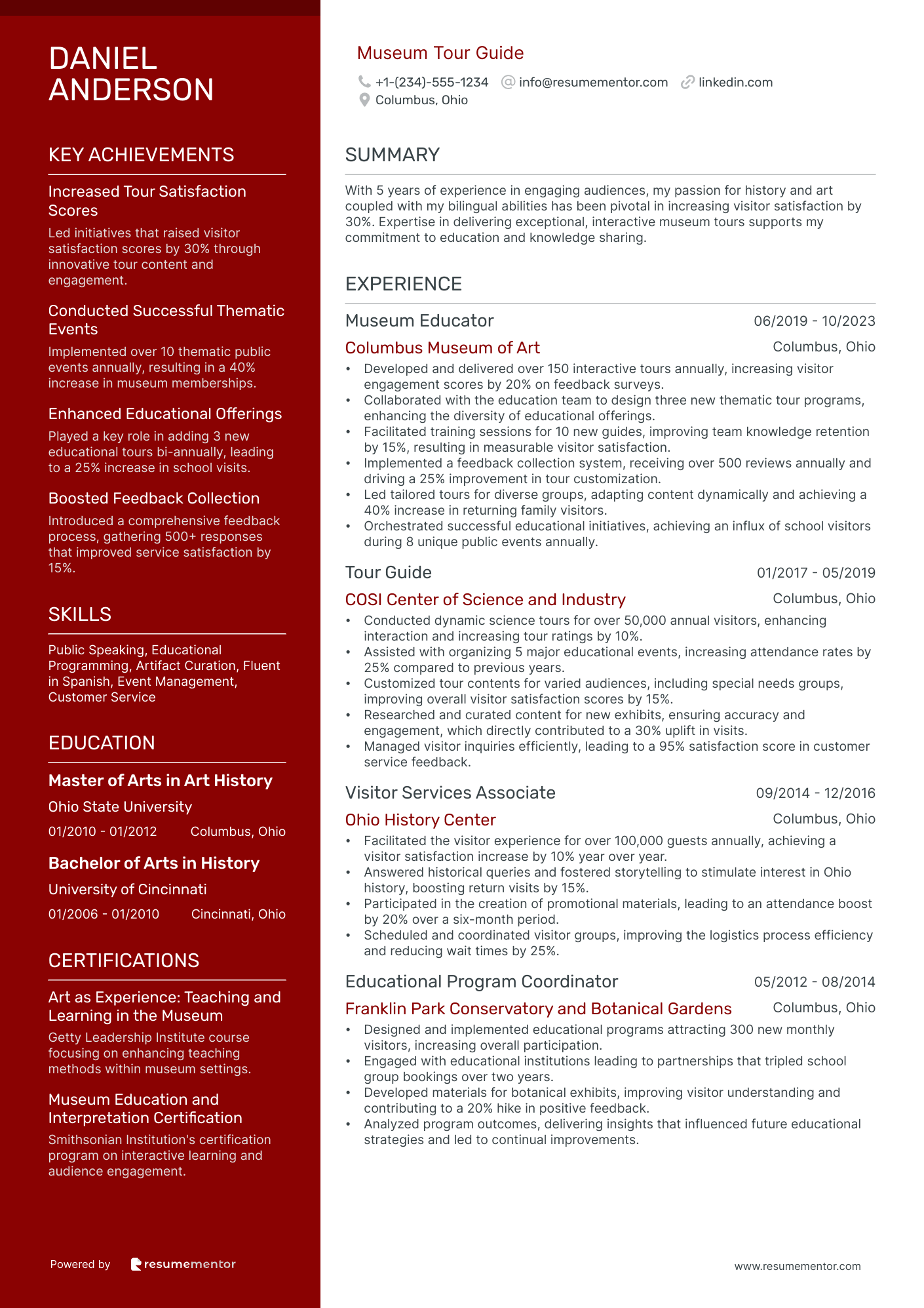
Museum Tour Guide
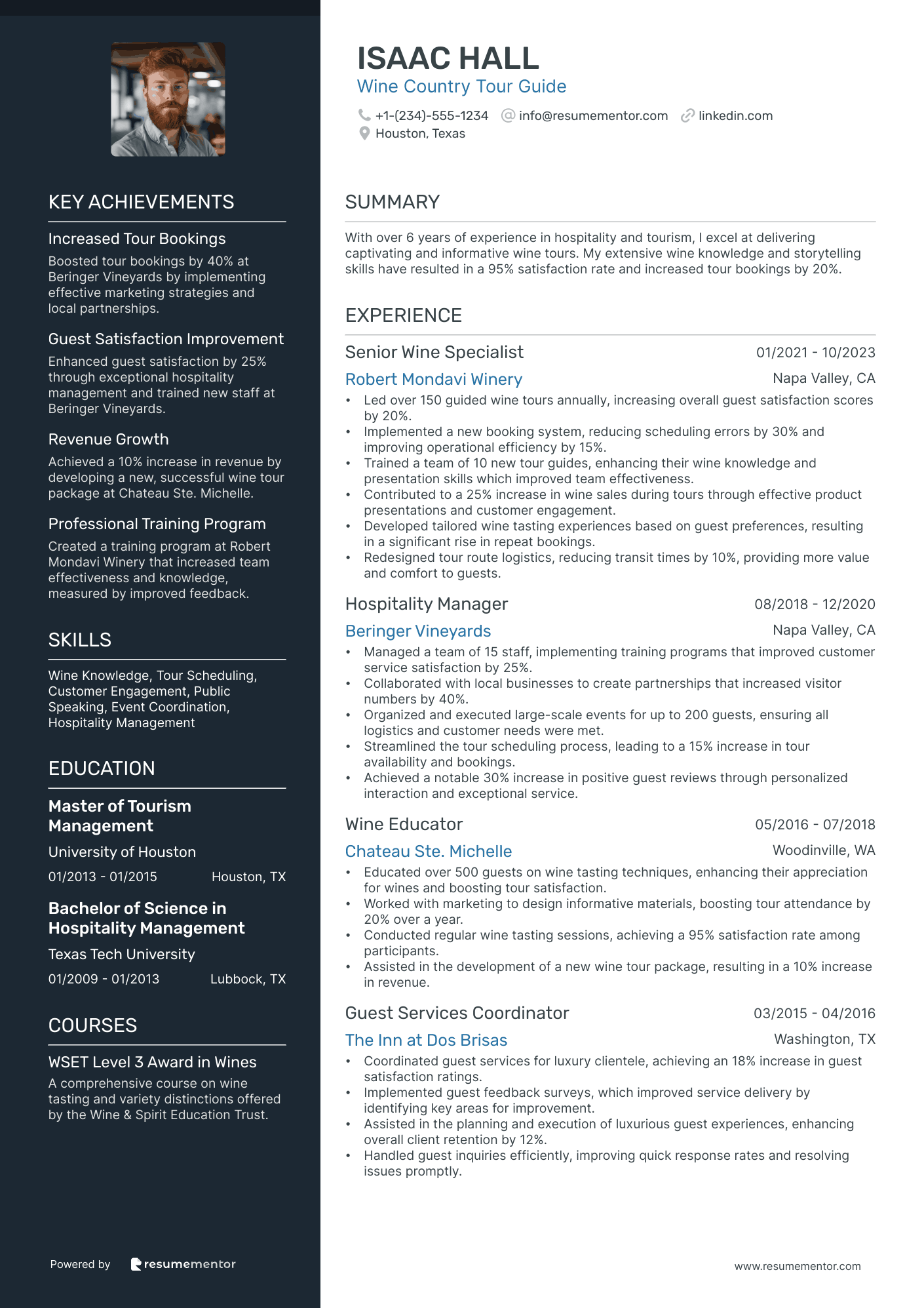
Wine Country Tour Guide
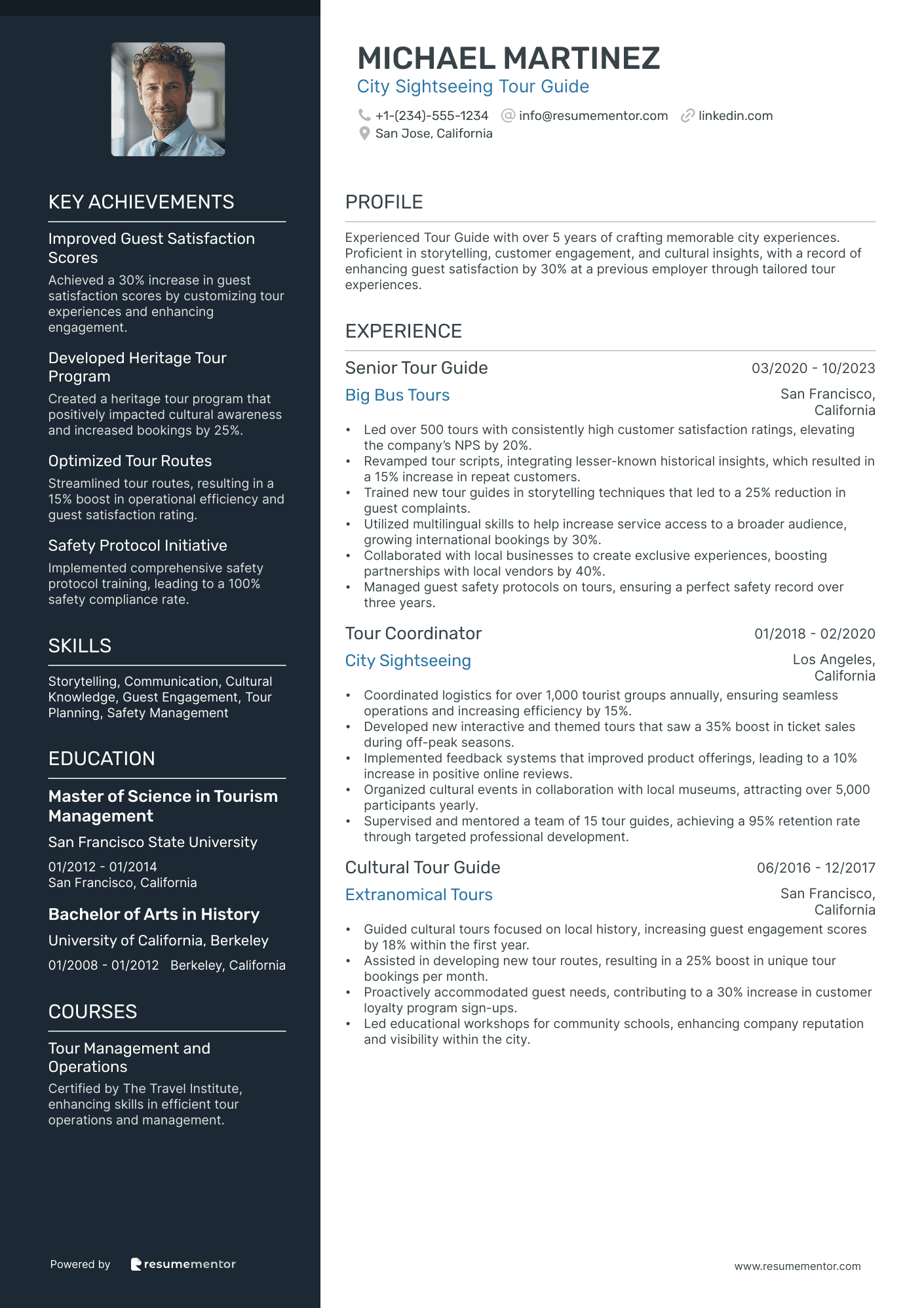
City Sightseeing Tour Guide
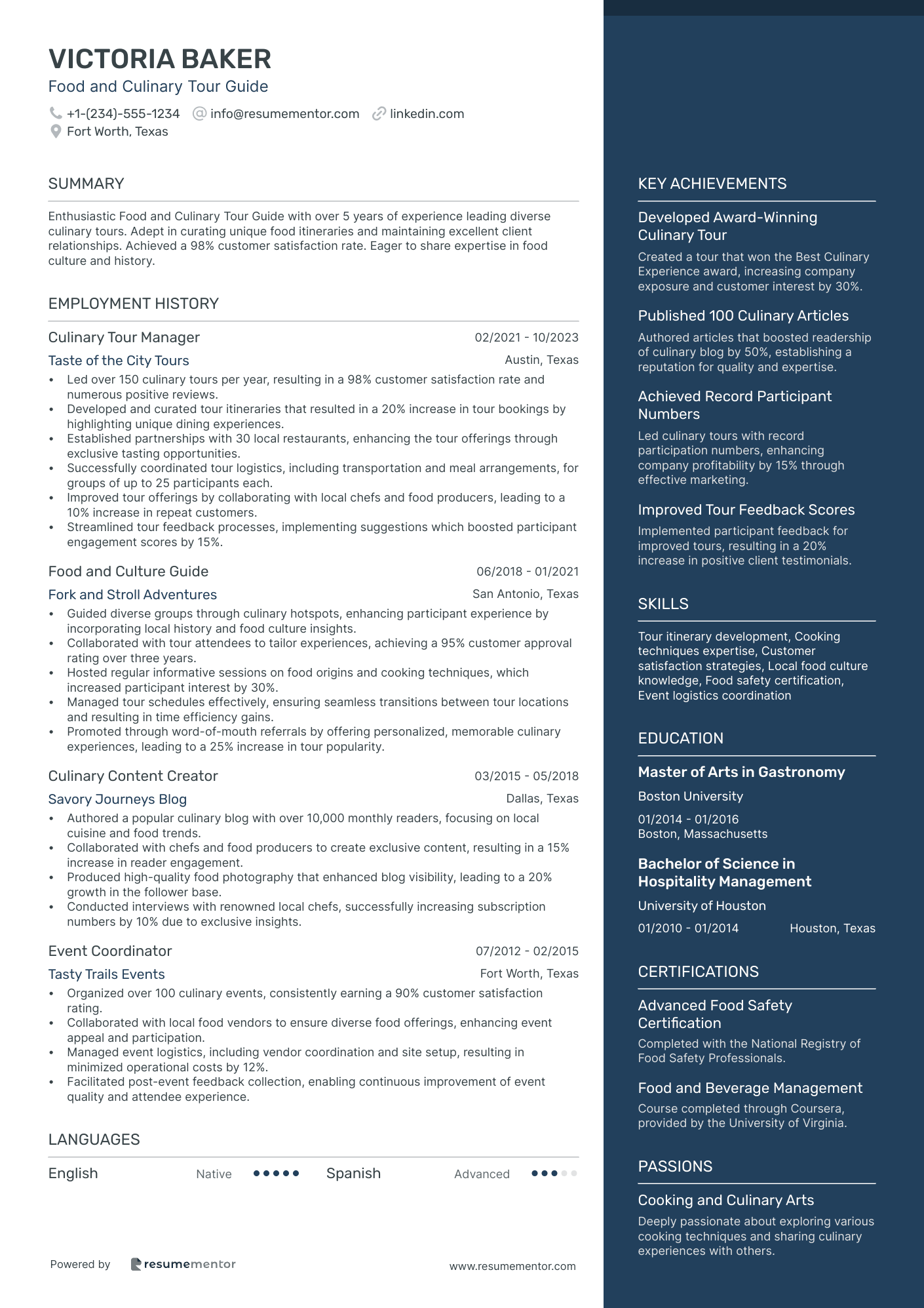
Food and Culinary Tour Guide
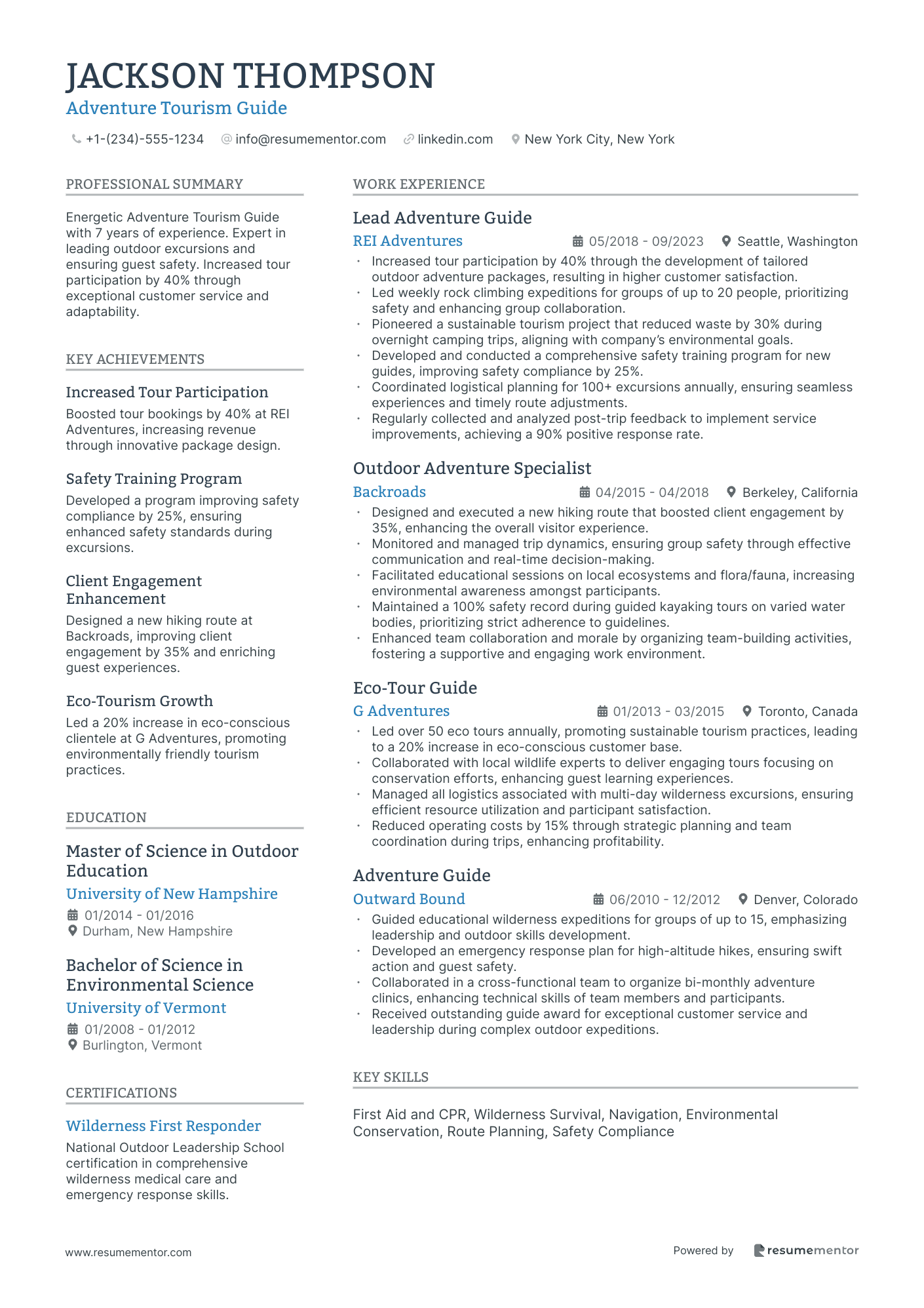
Adventure Tourism Guide
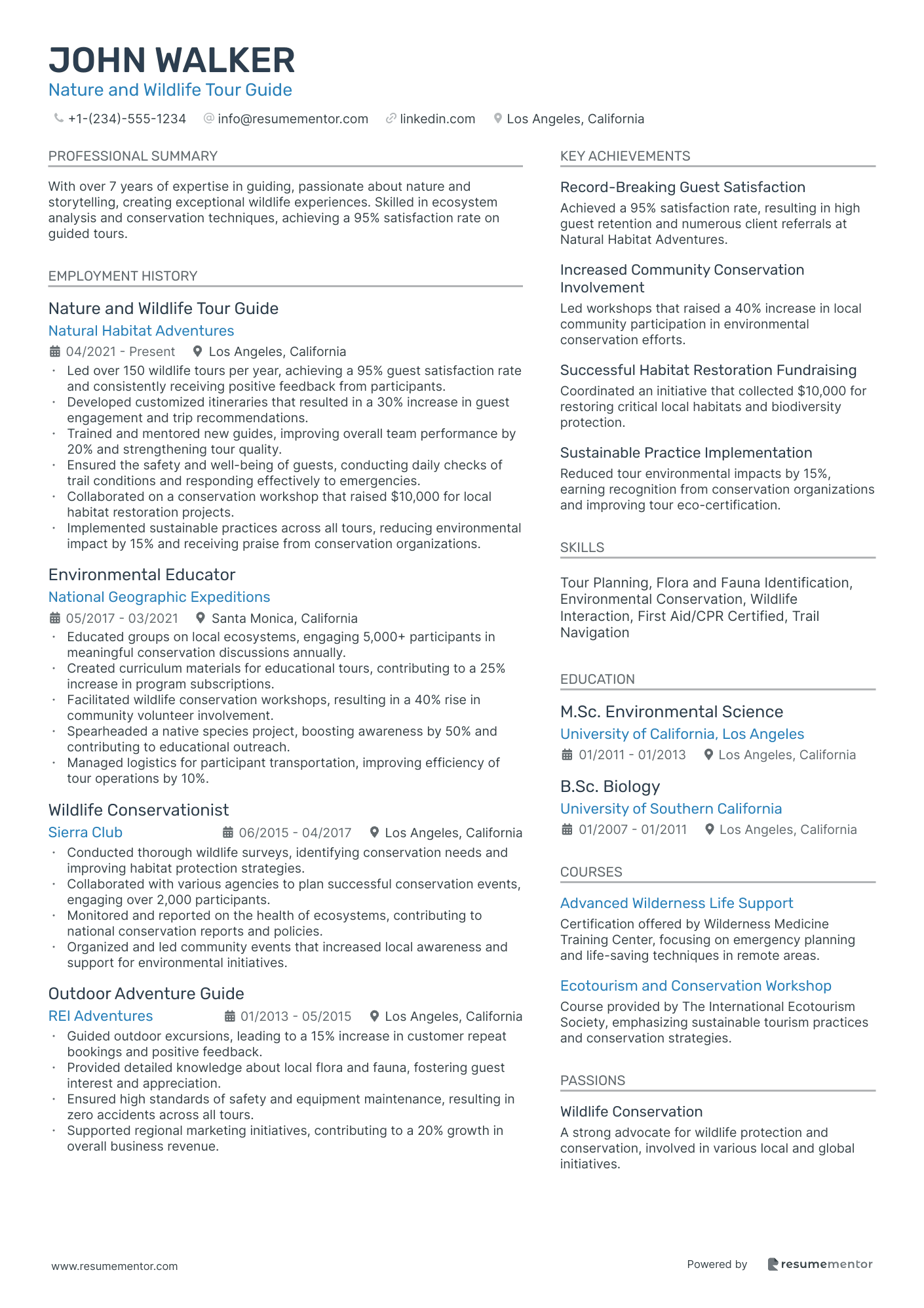
Nature and Wildlife Tour Guide
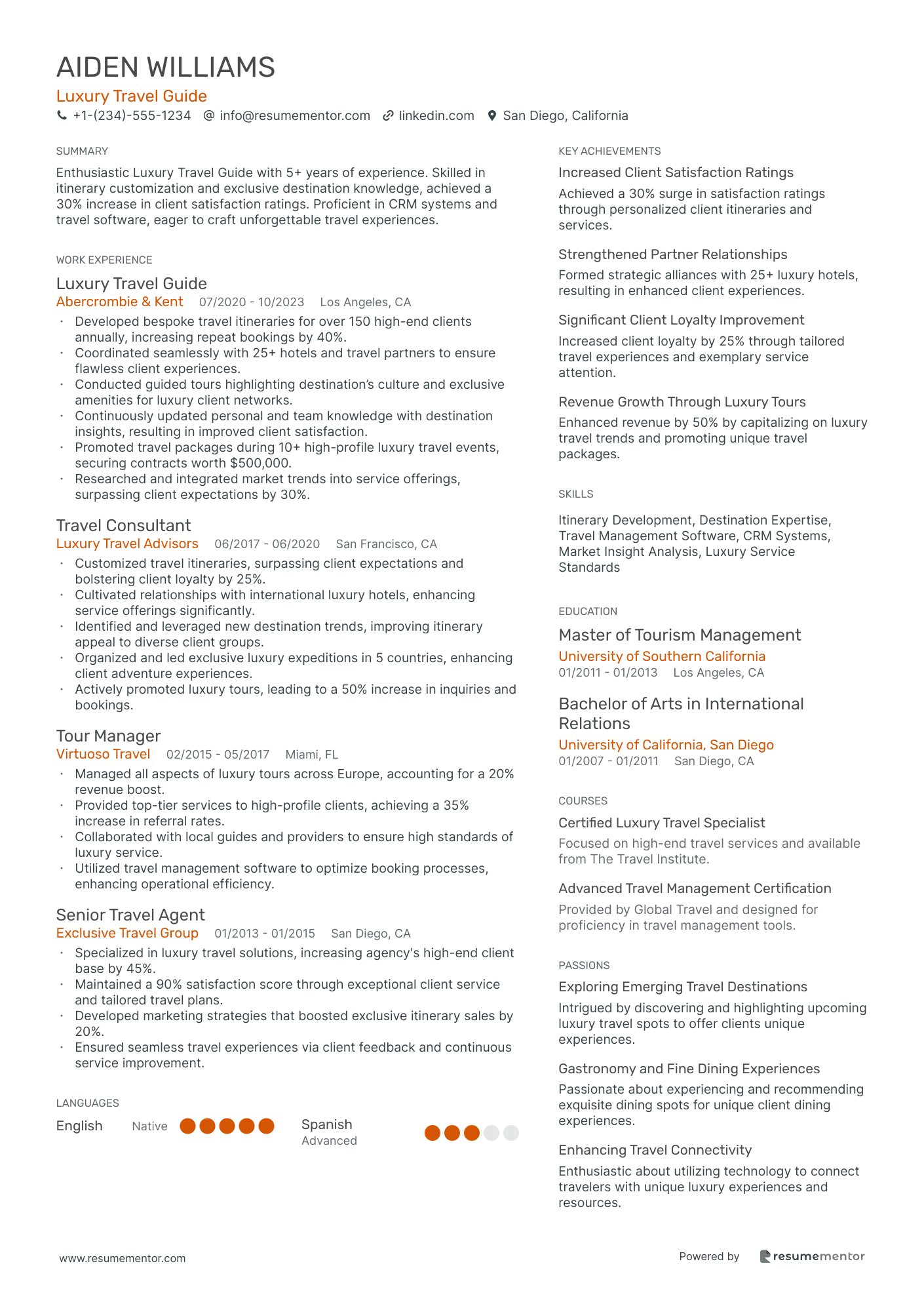
Luxury Travel Guide
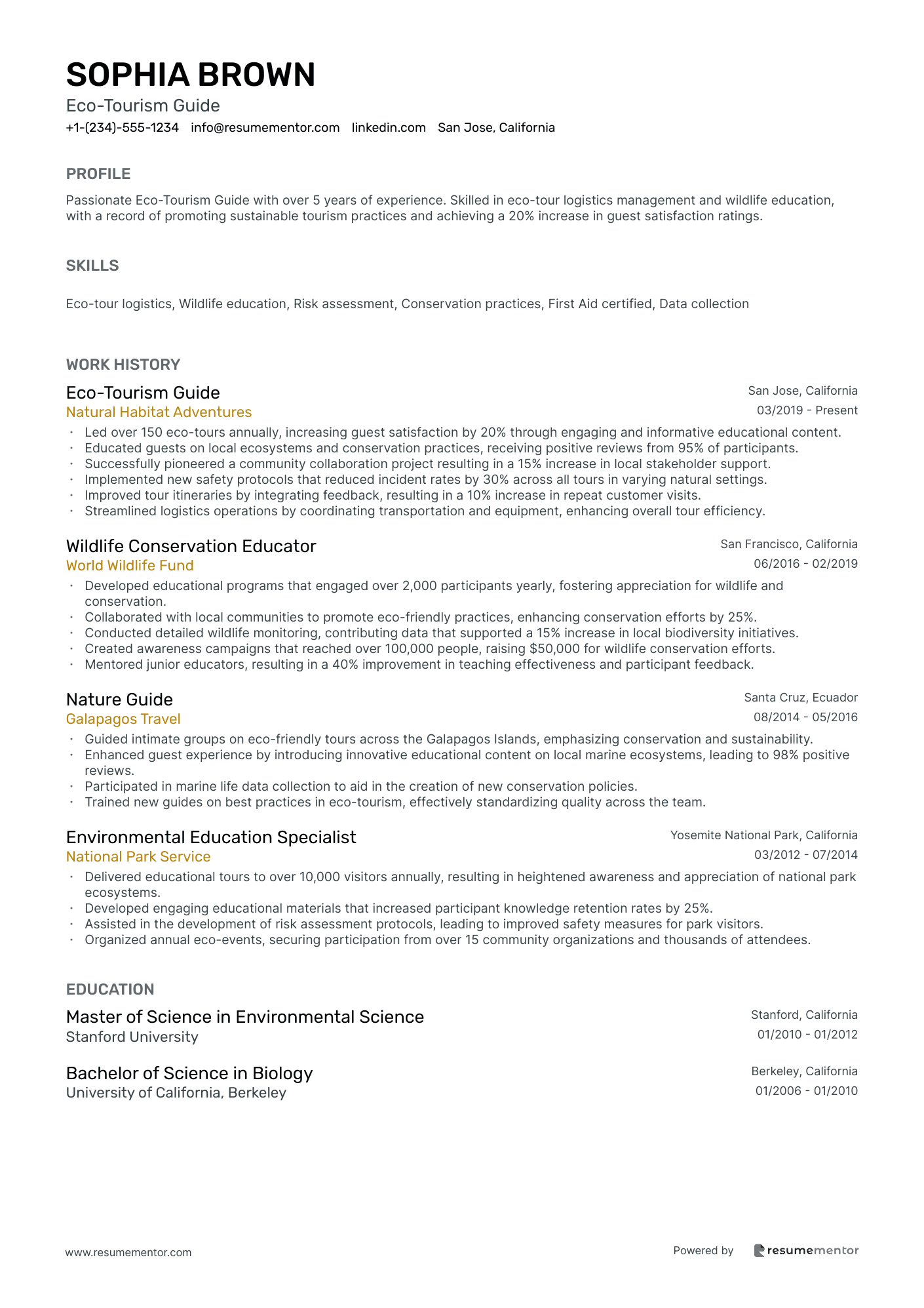
Eco-Tourism Guide
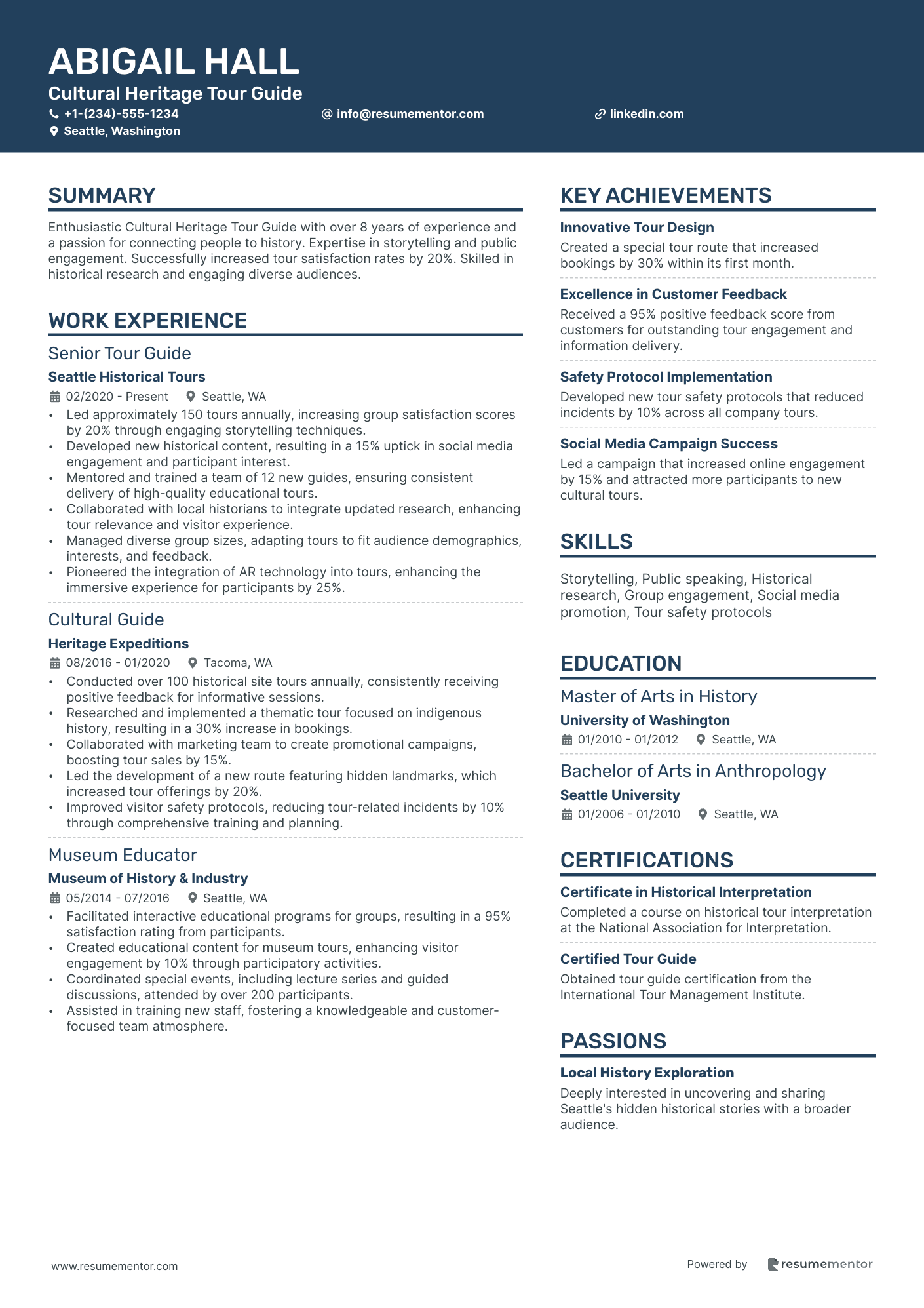
Cultural Heritage Tour Guide

Historical Site Tour Guide resume sample
- •Increased tour attendance by 30% by developing engaging content and incorporating interactive elements to engage visitors.
- •Led a team on a research project to expand and update historical content, adding 20% more new information to tours.
- •Implemented a feedback mechanism to gather visitor responses, resulting in a 15% improvement in visitor satisfaction scores.
- •Organized and led special events, including a revolutionary war reenactment that attracted over 1,000 attendees.
- •Collaborated with marketing to create promotional content that boosted online engagement by 25% for upcoming events.
- •Trained new tour guides on site policies and interpretative best practices, improving team consistency and effectiveness.
- •Provided daily tours to over 200 visitors, ensuring each had an accurate understanding of key historical events.
- •Collaborated in developing a new interactive visitor center exhibit focused on the Texas Revolution, enhancing visitor engagement.
- •Spearheaded a volunteer program that successfully recruited and trained 50 new volunteers in interpretative techniques.
- •Conducted educational workshops for school groups, resulting in a 20% increase in school visits and partnerships.
- •Worked closely with researchers to maintain historically accurate interpretative scripts and materials.
- •Designed and implemented educational programs that catered to over 10,000 students annually, fostering a passion for learning about history.
- •Led a digital content initiative that expanded the museum's reach online, increasing website traffic by 40%.
- •Organized coordinated training sessions for 30 staff members, improving overall program quality and visitor engagement.
- •Established partnerships with local schools to integrate museum education materials into classroom lessons.
- •Assisted in curating a comprehensive exhibit on American civil wars, increasing visitor numbers to the exhibit by 25%.
- •Maintained accurate and engaging presentation materials, ensuring they reflected current historical research and storytelling techniques.
- •Facilitated focus groups to gather feedback on exhibits, implementing changes that improved visitor experience ratings by 10%.
Museum Tour Guide resume sample
- •Developed and delivered over 150 interactive tours annually, increasing visitor engagement scores by 20% on feedback surveys.
- •Collaborated with the education team to design three new thematic tour programs, enhancing the diversity of educational offerings.
- •Facilitated training sessions for 10 new guides, improving team knowledge retention by 15%, resulting in measurable visitor satisfaction.
- •Implemented a feedback collection system, receiving over 500 reviews annually and driving a 25% improvement in tour customization.
- •Led tailored tours for diverse groups, adapting content dynamically and achieving a 40% increase in returning family visitors.
- •Orchestrated successful educational initiatives, achieving an influx of school visitors during 8 unique public events annually.
- •Conducted dynamic science tours for over 50,000 annual visitors, enhancing interaction and increasing tour ratings by 10%.
- •Assisted with organizing 5 major educational events, increasing attendance rates by 25% compared to previous years.
- •Customized tour contents for varied audiences, including special needs groups, improving overall visitor satisfaction scores by 15%.
- •Researched and curated content for new exhibits, ensuring accuracy and engagement, which directly contributed to a 30% uplift in visits.
- •Managed visitor inquiries efficiently, leading to a 95% satisfaction score in customer service feedback.
- •Facilitated the visitor experience for over 100,000 guests annually, achieving a visitor satisfaction increase by 10% year over year.
- •Answered historical queries and fostered storytelling to stimulate interest in Ohio history, boosting return visits by 15%.
- •Participated in the creation of promotional materials, leading to an attendance boost by 20% over a six-month period.
- •Scheduled and coordinated visitor groups, improving the logistics process efficiency and reducing wait times by 25%.
- •Designed and implemented educational programs attracting 300 new monthly visitors, increasing overall participation.
- •Engaged with educational institutions leading to partnerships that tripled school group bookings over two years.
- •Developed materials for botanical exhibits, improving visitor understanding and contributing to a 20% hike in positive feedback.
- •Analyzed program outcomes, delivering insights that influenced future educational strategies and led to continual improvements.
Wine Country Tour Guide resume sample
- •Led over 150 guided wine tours annually, increasing overall guest satisfaction scores by 20%.
- •Implemented a new booking system, reducing scheduling errors by 30% and improving operational efficiency by 15%.
- •Trained a team of 10 new tour guides, enhancing their wine knowledge and presentation skills which improved team effectiveness.
- •Contributed to a 25% increase in wine sales during tours through effective product presentations and customer engagement.
- •Developed tailored wine tasting experiences based on guest preferences, resulting in a significant rise in repeat bookings.
- •Redesigned tour route logistics, reducing transit times by 10%, providing more value and comfort to guests.
- •Managed a team of 15 staff, implementing training programs that improved customer service satisfaction by 25%.
- •Collaborated with local businesses to create partnerships that increased visitor numbers by 40%.
- •Organized and executed large-scale events for up to 200 guests, ensuring all logistics and customer needs were met.
- •Streamlined the tour scheduling process, leading to a 15% increase in tour availability and bookings.
- •Achieved a notable 30% increase in positive guest reviews through personalized interaction and exceptional service.
- •Educated over 500 guests on wine tasting techniques, enhancing their appreciation for wines and boosting tour satisfaction.
- •Worked with marketing to design informative materials, boosting tour attendance by 20% over a year.
- •Conducted regular wine tasting sessions, achieving a 95% satisfaction rate among participants.
- •Assisted in the development of a new wine tour package, resulting in a 10% increase in revenue.
- •Coordinated guest services for luxury clientele, achieving an 18% increase in guest satisfaction ratings.
- •Implemented guest feedback surveys, which improved service delivery by identifying key areas for improvement.
- •Assisted in the planning and execution of luxurious guest experiences, enhancing overall client retention by 12%.
- •Handled guest inquiries efficiently, improving quick response rates and resolving issues promptly.
City Sightseeing Tour Guide resume sample
- •Led over 500 tours with consistently high customer satisfaction ratings, elevating the company’s NPS by 20%.
- •Revamped tour scripts, integrating lesser-known historical insights, which resulted in a 15% increase in repeat customers.
- •Trained new tour guides in storytelling techniques that led to a 25% reduction in guest complaints.
- •Utilized multilingual skills to help increase service access to a broader audience, growing international bookings by 30%.
- •Collaborated with local businesses to create exclusive experiences, boosting partnerships with local vendors by 40%.
- •Managed guest safety protocols on tours, ensuring a perfect safety record over three years.
- •Coordinated logistics for over 1,000 tourist groups annually, ensuring seamless operations and increasing efficiency by 15%.
- •Developed new interactive and themed tours that saw a 35% boost in ticket sales during off-peak seasons.
- •Implemented feedback systems that improved product offerings, leading to a 10% increase in positive online reviews.
- •Organized cultural events in collaboration with local museums, attracting over 5,000 participants yearly.
- •Supervised and mentored a team of 15 tour guides, achieving a 95% retention rate through targeted professional development.
- •Guided cultural tours focused on local history, increasing guest engagement scores by 18% within the first year.
- •Assisted in developing new tour routes, resulting in a 25% boost in unique tour bookings per month.
- •Proactively accommodated guest needs, contributing to a 30% increase in customer loyalty program sign-ups.
- •Led educational workshops for community schools, enhancing company reputation and visibility within the city.
- •Resolved customer inquiries with a 95% satisfaction rate, contributing to a significant improvement in service excellence metrics.
- •Implemented feedback improvements that reduced response times by 40%, enhancing overall customer experience.
- •Developed a comprehensive FAQ resource that decreased inbound queries by 20% within three months.
- •Collaborated on a cross-functional team to streamline booking processes, improving user experience and increasing bookings by 15%.
Food and Culinary Tour Guide resume sample
- •Led over 150 culinary tours per year, resulting in a 98% customer satisfaction rate and numerous positive reviews.
- •Developed and curated tour itineraries that resulted in a 20% increase in tour bookings by highlighting unique dining experiences.
- •Established partnerships with 30 local restaurants, enhancing the tour offerings through exclusive tasting opportunities.
- •Successfully coordinated tour logistics, including transportation and meal arrangements, for groups of up to 25 participants each.
- •Improved tour offerings by collaborating with local chefs and food producers, leading to a 10% increase in repeat customers.
- •Streamlined tour feedback processes, implementing suggestions which boosted participant engagement scores by 15%.
- •Guided diverse groups through culinary hotspots, enhancing participant experience by incorporating local history and food culture insights.
- •Collaborated with tour attendees to tailor experiences, achieving a 95% customer approval rating over three years.
- •Hosted regular informative sessions on food origins and cooking techniques, which increased participant interest by 30%.
- •Managed tour schedules effectively, ensuring seamless transitions between tour locations and resulting in time efficiency gains.
- •Promoted through word-of-mouth referrals by offering personalized, memorable culinary experiences, leading to a 25% increase in tour popularity.
- •Authored a popular culinary blog with over 10,000 monthly readers, focusing on local cuisine and food trends.
- •Collaborated with chefs and food producers to create exclusive content, resulting in a 15% increase in reader engagement.
- •Produced high-quality food photography that enhanced blog visibility, leading to a 20% growth in the follower base.
- •Conducted interviews with renowned local chefs, successfully increasing subscription numbers by 10% due to exclusive insights.
- •Organized over 100 culinary events, consistently earning a 90% customer satisfaction rating.
- •Collaborated with local food vendors to ensure diverse food offerings, enhancing event appeal and participation.
- •Managed event logistics, including vendor coordination and site setup, resulting in minimized operational costs by 12%.
- •Facilitated post-event feedback collection, enabling continuous improvement of event quality and attendee experience.
Adventure Tourism Guide resume sample
- •Increased tour participation by 40% through the development of tailored outdoor adventure packages, resulting in higher customer satisfaction.
- •Led weekly rock climbing expeditions for groups of up to 20 people, prioritizing safety and enhancing group collaboration.
- •Pioneered a sustainable tourism project that reduced waste by 30% during overnight camping trips, aligning with company’s environmental goals.
- •Developed and conducted a comprehensive safety training program for new guides, improving safety compliance by 25%.
- •Coordinated logistical planning for 100+ excursions annually, ensuring seamless experiences and timely route adjustments.
- •Regularly collected and analyzed post-trip feedback to implement service improvements, achieving a 90% positive response rate.
- •Designed and executed a new hiking route that boosted client engagement by 35%, enhancing the overall visitor experience.
- •Monitored and managed trip dynamics, ensuring group safety through effective communication and real-time decision-making.
- •Facilitated educational sessions on local ecosystems and flora/fauna, increasing environmental awareness amongst participants.
- •Maintained a 100% safety record during guided kayaking tours on varied water bodies, prioritizing strict adherence to guidelines.
- •Enhanced team collaboration and morale by organizing team-building activities, fostering a supportive and engaging work environment.
- •Led over 50 eco tours annually, promoting sustainable tourism practices, leading to a 20% increase in eco-conscious customer base.
- •Collaborated with local wildlife experts to deliver engaging tours focusing on conservation efforts, enhancing guest learning experiences.
- •Managed all logistics associated with multi-day wilderness excursions, ensuring efficient resource utilization and participant satisfaction.
- •Reduced operating costs by 15% through strategic planning and team coordination during trips, enhancing profitability.
- •Guided educational wilderness expeditions for groups of up to 15, emphasizing leadership and outdoor skills development.
- •Developed an emergency response plan for high-altitude hikes, ensuring swift action and guest safety.
- •Collaborated in a cross-functional team to organize bi-monthly adventure clinics, enhancing technical skills of team members and participants.
- •Received outstanding guide award for exceptional customer service and leadership during complex outdoor expeditions.
Nature and Wildlife Tour Guide resume sample
- •Led over 150 wildlife tours per year, achieving a 95% guest satisfaction rate and consistently receiving positive feedback from participants.
- •Developed customized itineraries that resulted in a 30% increase in guest engagement and trip recommendations.
- •Trained and mentored new guides, improving overall team performance by 20% and strengthening tour quality.
- •Ensured the safety and well-being of guests, conducting daily checks of trail conditions and responding effectively to emergencies.
- •Collaborated on a conservation workshop that raised $10,000 for local habitat restoration projects.
- •Implemented sustainable practices across all tours, reducing environmental impact by 15% and receiving praise from conservation organizations.
- •Educated groups on local ecosystems, engaging 5,000+ participants in meaningful conservation discussions annually.
- •Created curriculum materials for educational tours, contributing to a 25% increase in program subscriptions.
- •Facilitated wildlife conservation workshops, resulting in a 40% rise in community volunteer involvement.
- •Spearheaded a native species project, boosting awareness by 50% and contributing to educational outreach.
- •Managed logistics for participant transportation, improving efficiency of tour operations by 10%.
- •Conducted thorough wildlife surveys, identifying conservation needs and improving habitat protection strategies.
- •Collaborated with various agencies to plan successful conservation events, engaging over 2,000 participants.
- •Monitored and reported on the health of ecosystems, contributing to national conservation reports and policies.
- •Organized and led community events that increased local awareness and support for environmental initiatives.
- •Guided outdoor excursions, leading to a 15% increase in customer repeat bookings and positive feedback.
- •Provided detailed knowledge about local flora and fauna, fostering guest interest and appreciation.
- •Ensured high standards of safety and equipment maintenance, resulting in zero accidents across all tours.
- •Supported regional marketing initiatives, contributing to a 20% growth in overall business revenue.
Luxury Travel Guide resume sample
- •Developed bespoke travel itineraries for over 150 high-end clients annually, increasing repeat bookings by 40%.
- •Coordinated seamlessly with 25+ hotels and travel partners to ensure flawless client experiences.
- •Conducted guided tours highlighting destination’s culture and exclusive amenities for luxury client networks.
- •Continuously updated personal and team knowledge with destination insights, resulting in improved client satisfaction.
- •Promoted travel packages during 10+ high-profile luxury travel events, securing contracts worth $500,000.
- •Researched and integrated market trends into service offerings, surpassing client expectations by 30%.
- •Customized travel itineraries, surpassing client expectations and bolstering client loyalty by 25%.
- •Cultivated relationships with international luxury hotels, enhancing service offerings significantly.
- •Identified and leveraged new destination trends, improving itinerary appeal to diverse client groups.
- •Organized and led exclusive luxury expeditions in 5 countries, enhancing client adventure experiences.
- •Actively promoted luxury tours, leading to a 50% increase in inquiries and bookings.
- •Managed all aspects of luxury tours across Europe, accounting for a 20% revenue boost.
- •Provided top-tier services to high-profile clients, achieving a 35% increase in referral rates.
- •Collaborated with local guides and providers to ensure high standards of luxury service.
- •Utilized travel management software to optimize booking processes, enhancing operational efficiency.
- •Specialized in luxury travel solutions, increasing agency's high-end client base by 45%.
- •Maintained a 90% satisfaction score through exceptional client service and tailored travel plans.
- •Developed marketing strategies that boosted exclusive itinerary sales by 20%.
- •Ensured seamless travel experiences via client feedback and continuous service improvement.
Eco-Tourism Guide resume sample
- •Led over 150 eco-tours annually, increasing guest satisfaction by 20% through engaging and informative educational content.
- •Educated guests on local ecosystems and conservation practices, receiving positive reviews from 95% of participants.
- •Successfully pioneered a community collaboration project resulting in a 15% increase in local stakeholder support.
- •Implemented new safety protocols that reduced incident rates by 30% across all tours in varying natural settings.
- •Improved tour itineraries by integrating feedback, resulting in a 10% increase in repeat customer visits.
- •Streamlined logistics operations by coordinating transportation and equipment, enhancing overall tour efficiency.
- •Developed educational programs that engaged over 2,000 participants yearly, fostering appreciation for wildlife and conservation.
- •Collaborated with local communities to promote eco-friendly practices, enhancing conservation efforts by 25%.
- •Conducted detailed wildlife monitoring, contributing data that supported a 15% increase in local biodiversity initiatives.
- •Created awareness campaigns that reached over 100,000 people, raising $50,000 for wildlife conservation efforts.
- •Mentored junior educators, resulting in a 40% improvement in teaching effectiveness and participant feedback.
- •Guided intimate groups on eco-friendly tours across the Galapagos Islands, emphasizing conservation and sustainability.
- •Enhanced guest experience by introducing innovative educational content on local marine ecosystems, leading to 98% positive reviews.
- •Participated in marine life data collection to aid in the creation of new conservation policies.
- •Trained new guides on best practices in eco-tourism, effectively standardizing quality across the team.
- •Delivered educational tours to over 10,000 visitors annually, resulting in heightened awareness and appreciation of national park ecosystems.
- •Developed engaging educational materials that increased participant knowledge retention rates by 25%.
- •Assisted in the development of risk assessment protocols, leading to improved safety measures for park visitors.
- •Organized annual eco-events, securing participation from over 15 community organizations and thousands of attendees.
Cultural Heritage Tour Guide resume sample
- •Led approximately 150 tours annually, increasing group satisfaction scores by 20% through engaging storytelling techniques.
- •Developed new historical content, resulting in a 15% uptick in social media engagement and participant interest.
- •Mentored and trained a team of 12 new guides, ensuring consistent delivery of high-quality educational tours.
- •Collaborated with local historians to integrate updated research, enhancing tour relevance and visitor experience.
- •Managed diverse group sizes, adapting tours to fit audience demographics, interests, and feedback.
- •Pioneered the integration of AR technology into tours, enhancing the immersive experience for participants by 25%.
- •Conducted over 100 historical site tours annually, consistently receiving positive feedback for informative sessions.
- •Researched and implemented a thematic tour focused on indigenous history, resulting in a 30% increase in bookings.
- •Collaborated with marketing team to create promotional campaigns, boosting tour sales by 15%.
- •Led the development of a new route featuring hidden landmarks, which increased tour offerings by 20%.
- •Improved visitor safety protocols, reducing tour-related incidents by 10% through comprehensive training and planning.
- •Facilitated interactive educational programs for groups, resulting in a 95% satisfaction rating from participants.
- •Created educational content for museum tours, enhancing visitor engagement by 10% through participatory activities.
- •Coordinated special events, including lecture series and guided discussions, attended by over 200 participants.
- •Assisted in training new staff, fostering a knowledgeable and customer-focused team atmosphere.
- •Delivered engaging historical interpretations to tour groups, enhancing knowledge retention by 15%.
- •Updated and refined tour scripts, incorporating new historical findings and increasing rebookings by 12%.
- •Coordinated with community leaders to incorporate diverse narratives into tours, enriching the cultural perspective presented to guests.
- •Championed guest feedback initiatives, leading to a 25% improvement in tour experiences based on participant suggestions.
Crafting a resume as a tour guide can feel like trying to fit the wonders of the world into a single itinerary—every detail matters. Each day, you bring history to life and explore diverse landscapes, yet capturing these vibrant experiences in writing can be challenging. That's why having a standout resume is essential, whether you're applying for your first job or seeking new opportunities. Without a well-crafted resume, your potential might remain hidden, missing the chance to impress hiring managers just as you do your tour groups.
As a tour guide, highlighting your unique talents such as engaging storytelling and expert local knowledge is crucial. It's not only about listing past jobs; it's about illustrating how your skills enhance the traveler's journey. To ensure your resume looks as good as it reads, a polished, professional layout is important. Using a resume template can help you achieve this by giving your document a tidy, organized appearance. With resume templates, structuring your skills and background becomes seamless and visually appealing.
The transition from drafting to a compelling resume involves careful thought, but with the right guidance and tools, you’ll present yourself as the ideal candidate. A well-crafted resume could be your ticket to embarking on new adventures in your tour guiding career. So, let's dive into how you can effectively bring all these elements together.
Key Takeaways
- A tour guide resume should emphasize your engaging communication, storytelling expertise, and a well-rounded professional summary to intrigue recruiters.
- Use a reverse-chronological format to highlight recent job experiences, and choose modern fonts like Montserrat or Raleway for clarity and professional appeal.
- The experience section should quantify achievements, such as customer satisfaction improvements, using strong action words and relevant job titles.
- Highlight both hard skills, like language proficiency and navigation, and soft skills such as adaptability and communication in your resume.
- Incorporate an education section that is closely tailored to the tour guide role, highlighting relevant degrees, coursework, and honors to demonstrate your knowledge and readiness.
What to focus on when writing your tour guide resume
A tour guide resume should highlight your ability to engage and educate diverse groups through expert communication and cultural knowledge—this foundation allows you to express your expertise in storytelling, logistical planning, and customer service. It's vital that you convey your passion for travel and history, showing your potential to lead tours that create memorable experiences.
How to structure your tour guide resume
- Contact Information: Begin with your full name, phone number, and professional email—it's critical to ensure recruiters can contact you easily, which sets the stage for a positive first impression.
- Professional Summary: Offer a snapshot of your guiding career, focusing on unique experiences and abilities—this snapshot should captivate recruiters by illustrating your skill in organizing tours that are both informative and enjoyable.
- Work Experience: Detail your previous guiding roles, mentioning the variety of locations and tour types you've managed—highlighting specific achievements like extraordinary customer satisfaction or positive reviews demonstrates your proven success in the role.
- Skills: Include skills like public speaking, multilingual abilities, and group management—these align directly with the expectations of a tour guide and show your readiness to excel in diverse situations.
- Education: List relevant degrees or certifications, such as a history degree or involvement with professional guiding associations—these credentials underscore your dedication to the field and enhance your professional credibility.
- Certifications: Reinforce your qualifications by including any specific tour guide certifications, as well as First Aid or customer service training—these demonstrate your preparedness to handle any situation that might arise during tours.
Each part of the resume contributes to the cohesive story of your expertise as a tour guide. In the following sections, we'll delve deeper into the specifics of each part, exploring how to effectively format and flesh out these aspects in a way that truly captures a recruiter's attention.
Which resume format to choose
For crafting a compelling tour guide resume, start by focusing on the format to best highlight your skills and experiences. The reverse-chronological format is recommended because it leads with your most recent experiences, showcasing your career progression in a way that employers easily value. This format helps highlight the diverse experiences you've accumulated, an important aspect for any tour guide.
Next, consider the font, as it subtly influences how your resume is perceived. Fonts like Montserrat, Raleway, and Lato add a modern touch, complementing the vibrant and engaging nature of the travel industry. These fonts ensure clarity and readability, focusing attention on your content, not just the design.
File type also plays a critical role. Saving your resume as a PDF preserves your layout across all platforms, ensuring that your application looks polished and professional to any potential employer. A PDF also avoids any accidental formatting changes, maintaining the integrity of your presentation.
Margins might seem minor, but they can effectively impact readability. Keeping margins between 0.5 and 1 inch strikes the right balance by framing your content neatly, ensuring it’s easy to navigate without appearing cluttered. This clean look supports a professional image, mirroring the organized and thoughtful approach necessary in guiding tours.
Incorporating these elements results in a professional and visually appealing resume. It reflects the attention to detail and presentation skills essential for a tour guide, helping your application stand out in the competitive travel industry.
How to write a quantifiable resume experience section
A strong tour guide resume experience section highlights your ability to engage and inform diverse groups, which is crucial for showcasing your skills effectively. As the heart of your resume, this section demonstrates your past successes and potential impact. By structuring it in reverse chronological order, you ensure that your most recent and relevant experiences are front and center. Including jobs from the last 10-15 years allows you to tailor your resume to feature positions that align closely with the job you're applying for, using titles that reflect the role you desire. Tailoring your resume to the job ad is essential, as it allows you to match your experiences with the qualifications listed, using action words like "guided," "led," "enhanced," and "coordinated" to convey your achievements. Quantifying your success whenever possible provides concrete evidence of your skills, making them undeniable.
Here's an example of a tour guide resume experience section:
- •Increased guest satisfaction ratings by 25% in exit surveys through engaging storytelling.
- •Led over 100 tours per year, showcasing in-depth knowledge of 50+ historical sites.
- •Trained 15 new guides, improving tour quality and consistency across the team.
- •Coordinated bilingual tours, resulting in a 40% increase in international tour bookings.
This experience section shines by effectively connecting quantifiable achievements to the skills essential for a tour guide role. By listing your most relevant information first, you highlight the latest skills and experiences that align with job needs. The tailored entries clearly demonstrate your ability to meet typical job ad requirements like boosting guest satisfaction and offering bilingual tours. These accomplishments are brought to life with dynamic action words, which emphasize your effectiveness and productivity. Numbers and percentages vividly illustrate your track record, setting you apart from others with less specific resumes. Furthermore, your role in training new guides showcases leadership, while coordinating bilingual tours underscores your adaptability and ability to reach a wider audience—an ideal mix for gaining a competitive edge in securing the job you desire.
Achievement-Focused resume experience section
An achievement-focused tour guide resume experience section should spotlight your successes and the skills that contributed to them. Start by listing the time you spent in the role and your job title, focusing on tangible outcomes like increasing satisfaction among tourists, improving tour ratings, or boosting participation. Using numbers, where possible, to quantify your achievements will give a clearer picture of your impact. This approach keeps your words straightforward and emphasizes the significant differences you've made.
Once you've set the stage, use bullet points to lay out your accomplishments, making it easy for potential employers to see your value quickly. Kick off each bullet with a strong action word that illustrates your role in these achievements. By sharing real examples, like organizing popular events or leading numerous successful tours, you add depth to your resume. Focus on actions that not only fulfilled your duties but also furthered company goals or supported special projects, ensuring your experience section captures the full scope of your contributions.
Tour Guide
Old Town Museum
June 2018 - Present
- Led over 150 tours annually with an average satisfaction rate of 98%
- Developed a new interactive tour format that increased participation by 25%
- Trained new guides in best practices, achieving a 20% improvement in guide performance scores
- Arranged and promoted special events that boosted visitor numbers by 30%
Skills-Focused resume experience section
A skills-focused tour guide resume experience section should highlight your expertise in communication, storytelling, cultural knowledge, and customer service. To begin, identify these essential skills and use action-driven language to show how you have applied them in your past roles. Clearly mention your position, where you worked, and the specific achievements that demonstrate your capabilities. This approach will emphasize your ability to engage and inform visitors, making your background more relevant to potential employers.
It's crucial to tailor your resume so that your strengths are immediately apparent. Keep the format clean by listing the dates of your employment first, followed by your job title and the company name. Under each job entry, use bullet points to connect your responsibilities with the skills you've developed, showcasing accomplishments like boosting guest satisfaction or increasing tour attendance. By providing concise and clear descriptions, your resume will better capture attention and highlight your value as a tour guide.
Tour Guide
City Heritage Tours
June 2019 - September 2023
- Led daily walking tours in the historic district, engaging groups with stories and historical facts.
- Increased customer satisfaction scores by 20% through attentive service and personalized experiences.
- Created new thematic tours that boosted overall attendance by 15% within the first year.
- Trained and mentored new tour guides, helping maintain company standards of excellence.
Problem-Solving Focused resume experience section
A problem-solving-focused tour guide resume experience section should emphasize your capability to handle challenges smoothly while ensuring customer satisfaction. Start by recalling key moments where your problem-solving skills shone, such as adapting to sudden weather changes or assisting visitors with special needs. Use action verbs to illustrate how you identified issues, implemented solutions, and delivered positive outcomes. Whenever possible, quantify your achievements to offer tangible proof of your abilities.
To make your experience shine, structure each bullet point in a way that clearly highlights your accomplishments and the impact of your actions. Connect your skills like flexibility, adaptability, and maintaining composure under pressure to how they contributed to successful tours. This helps show potential employers that you're detail-oriented and quick on your feet, ready to create memorable experiences for every guest on your tours.
Tour Guide
Adventure Tours Co.
June 2020 - August 2023
- Resolved logistical challenges for over 200 tours annually, ensuring smooth operations and happy customers.
- Adapted tour schedules to weather changes while maintaining a 95% customer satisfaction rate.
- Implemented a feedback system that improved service efficiency by 20% within a year.
- Handled emergencies on-site by coordinating seamlessly with staff and emergency services, ensuring guest safety.
Industry-Specific Focus resume experience section
A tour guide-focused resume experience section should spotlight the skills and achievements that matter most in guiding memorable tours. Start by describing your roles and how you brought value to your positions, emphasizing responsibilities and any specialized expertise, such as local history or cultural insights. Tailor your descriptions to show how you enhanced guest experiences, noting the size of groups you managed and the logistical challenges you overcame.
By using bullet points, you can clearly present your accomplishments, making it easy for hiring managers to recognize your strengths. Choose strong action verbs like "led," "organized," or "enhanced" to vividly depict your duties and successes. Highlight your ability to communicate with diverse audiences and your knack for creating engaging experiences. Demonstrate your professional worth by sharing quantifiable outcomes, like increased tour ratings or glowing customer feedback.
Tour Guide
Adventure Travel Co.
June 2018 - Present
- Conducted daily guided tours for groups of up to 20 people, boosting visitor satisfaction with engaging storytelling.
- Developed unique tour routes that showcased local history and culture, leading to a 25% increase in customer bookings.
- Offered personalized travel advice to guests, achieving a consistent 4.8/5 star rating on TripAdvisor.
- Handled logistics and resolved on-the-spot issues, including transportation, meal arrangements, and customer inquiries with efficiency.
Write your tour guide resume summary section
A tour guide-focused resume summary should vividly showcase your experience and skills, grabbing an employer's attention immediately. Highlighting your communication abilities and knowledge of different locations is essential. Start with specific achievements to stand out, like this example:
This summary effectively links the tour guide’s linguistic abilities with their focus on providing remarkable experiences, showing why they consistently receive high ratings. Presenting achievements and skills in this way aligns with what hiring managers look for in a candidate. Unlike a resume objective, which centers on personal career aspirations, a summary reflects past accomplishments and current strengths. While a resume profile can broadly outline skills and qualities, a summary of qualifications will break down relevant experiences into a concise list. Tailoring each section based on your career journey and the role you want helps create a powerful and lasting first impression.
Listing your tour guide skills on your resume
A skills-focused tour guide resume should effectively showcase your abilities across multiple sections. Whether you choose to list your skills in a dedicated section or weave them into your experience and summary, the goal is to highlight what makes you an exceptional tour guide. Your strengths, which often include soft skills like communication and adaptability, show how well you interact with others. Hard skills, such as language proficiency and historical knowledge, demonstrate your technical expertise.
Incorporating these skills and strengths as keywords in your resume can significantly boost your application’s visibility in digital searches and applicant tracking systems, helping you stand out. Here’s an example of a well-structured skills section:
This skills section is effective because it clearly presents eight essential skills, ensuring recruiters can quickly understand your capabilities.
Best hard skills to feature on your tour guide resume
For a tour guide, having certain hard skills demonstrates technical proficiency and expertise. These skills are crucial for providing informative and engaging tours.
Hard Skills
- Cultural Knowledge
- Language Proficiency
- Navigation Skills
- First Aid Certification
- Historical Knowledge
- Geographic Familiarity
- Technical Skills (using digital booking systems)
- Event Planning
- Legal and Safety Compliance
- Audience Management
- Group Leadership
- Public Speaking
- Transportation Coordination
- Conflict Resolution
- Local Area Expertise
Best soft skills to feature on your tour guide resume
Soft skills are just as important, enabling you to effectively engage and connect with diverse groups.
Bringing these skills together helps ensure you deliver memorable experiences that leave a lasting impression on your tour participants.
Soft Skills
- Communication
- Adaptability
- Interpersonal Skills
- Patience
- Enthusiasm
- Problem-Solving
- Attention to Detail
- Teamwork
- Confidence
- Creativity
- Empathy
- Active Listening
- Time Management
- Flexibility
- Customer Service
How to include your education on your resume
The education section is a crucial part of your tour guide resume. It not only shows your academic background but also how well-prepared you are for the job. Tailor this section specifically to the job you are applying for by excluding any education that does not relate to being a tour guide. Include your GPA if it is impressive, generally 3.5 or above, by listing it clearly next to your degree. If you graduated with honors, such as cum laude, this should also be noted, as it demonstrates excellence. When listing your degree, make sure to clearly describe the official title, the institution where you studied, and the dates you attended.
- •Graduated cum laude
- •Relevant coursework: World Cultures, History of Travel
The second example is excellent because it aligns with the tour guide role. A degree in History is relevant due to its exploration of cultures and events that a tour guide might discuss. The high GPA and cum laude honor communicate diligence and achievement. Listing relevant coursework, such as 'World Cultures', emphasizes knowledge that can be applied on tours. In addition, the clarity and conciseness of the entry make it easy for recruiters to see qualifications at a glance. Overall, this education section shows readiness and suitability for the position of a tour guide.
How to include tour guide certificates on your resume
Including a certificates section on a tour guide resume can significantly enhance your application. Certificates demonstrate your commitment to professional development and validate your skills. List the name of each certificate clearly to ensure they are easily recognized. Include the date when you earned the certificate to provide context for your timeline of achievements. Add the issuing organization to lend credibility to your qualifications.
Another option is to integrate key certificates directly into the header of your resume. For example, you could write, "Certified Tour Guide with CPR and First Aid Certification". This immediately highlights your qualifications to a potential employer.
Here's an example of a standalone certificates section:
This example is strong because it features certificates relevant to the tour guide role, demonstrating specialized training and safety preparedness. Selecting recognized organizations as issuers boosts the credibility of your guiding capabilities. Be sure to include similar details in your own resume to stand out.
Extra sections to include on your tour guide resume
Crafting a resume that stands out can make all the difference in securing a job as a tour guide. As you highlight your skills and experiences, consider including sections that showcase your linguistic abilities, personal interests, community involvement, and passion for knowledge.
Language section — List languages you speak fluently to showcase your ability to communicate with diverse tourists. Highlighting proficiency in languages like Spanish, French, or Mandarin can enhance your employability.
Hobbies and interests section — Share activities that display your engaging personality, such as hiking, photography, or history. This insights prospective employers into your potential to connect with travelers.
Volunteer work section — Detail your volunteer experiences that demonstrate your leadership and community dedication. Mention volunteering as a docent at a local museum or participating in community clean-ups.
Books section — Include a list of books related to world cultures, history, or geography to show your interest in continuous learning. Reading up on travel memoirs or guides can highlight your preparedness and passion for the field.
With these sections, your resume can better reflect your capabilities and interests, making it a powerful tool in your job search.
In Conclusion
In conclusion, crafting an effective tour guide resume requires more than just a list of past jobs; it's about telling the story of your skills, achievements, and the unique value you bring as a guide. By focusing on details like a well-structured format, clear presentation of skills, and quantifiable achievements, you can make a strong case for why you're the ideal candidate. Implementing a reverse-chronological format prioritizes recent and relevant experiences, which resonate best with recruiters. Remember to tailor each section to the specific role, whether it's through highlighting language skills, integrating relevant certificates, or emphasizing problem-solving abilities. By doing so, you not only capture the attention of hiring managers but also demonstrate your capability to engage and captivate diverse groups of travelers. Additionally, adding extra sections like language proficiency and volunteer work can provide a more rounded picture of your qualifications. Your resume becomes not just a document but a reflection of your passion for travel and history. Ultimately, a standout resume is your key to unlocking new adventures and opportunities in your tour guiding career. Your efforts in personalizing and perfecting this resume will make sure your skills stand out, just as you make each tour an unforgettable journey for your guests.
Related Articles

Continue Reading
Check more recommended readings to get the job of your dreams.
Resume
Resources
Tools
© 2026. All rights reserved.
Made with love by people who care.

